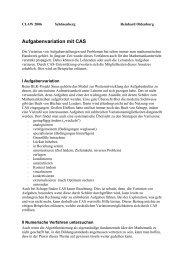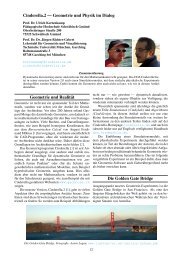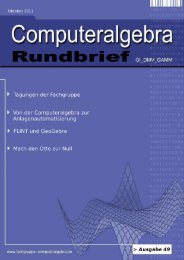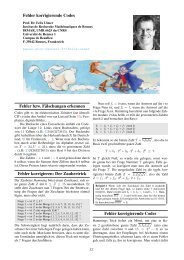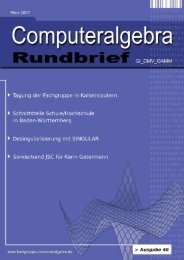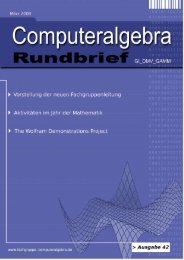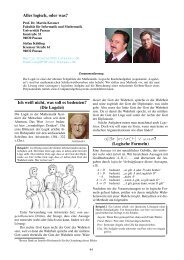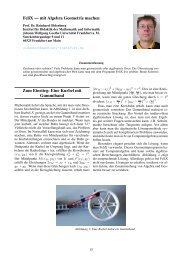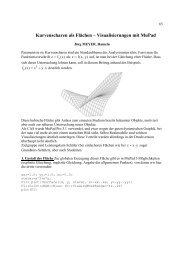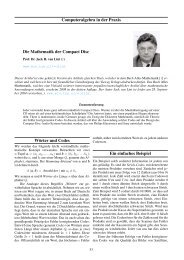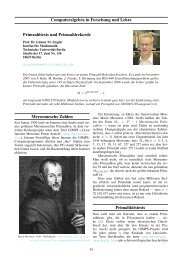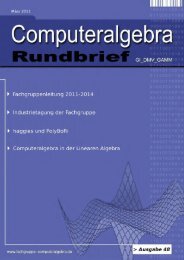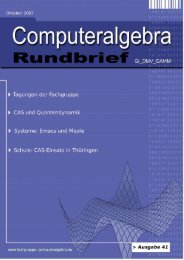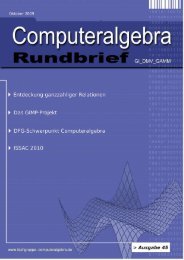Computeralgebra-Rundbrief - Fachgruppe Computeralgebra
Computeralgebra-Rundbrief - Fachgruppe Computeralgebra
Computeralgebra-Rundbrief - Fachgruppe Computeralgebra
Sie wollen auch ein ePaper? Erhöhen Sie die Reichweite Ihrer Titel.
YUMPU macht aus Druck-PDFs automatisch weboptimierte ePaper, die Google liebt.
ke it suitable for such a project. In addition, we have<br />
been taking technology developed as part of NKS and<br />
adding this to Mathematica. For example, we have added<br />
an optimized cellular automaton function, and this<br />
might be useful for running computations found in NKS.<br />
CAR: The user interface of Mathematica has not<br />
changed for a long time. Of course, Mathematica Notebooks<br />
are quite powerful, but they lack some new,<br />
modern interactive features. We have seen customizable<br />
user interfaces for Maple with the introduction<br />
of Maplets. Do you plan to incorporate user interface<br />
changes in Mathematica 6?<br />
TWJ: This is something on which we are working<br />
very hard. For many years Mathematica users have been<br />
building extended user interfaces with Java using<br />
our J/Link interface (which uses Java reflection to give<br />
a very tight integration with Mathematica). Recently,<br />
we released a beta version of GUIKit, a toolkit<br />
which sits on top of J/Link. This enormously simplifies<br />
the process of building user interfaces in Mathematica.<br />
See http://www.wolfram.com/solutions/<br />
mathlink/guikit/.<br />
This supports many features, such as an extensible<br />
component widget system, automatic layout, support for<br />
modal and non-modal interactions, and a scripting framework.<br />
In addition, since this combines with J/Link for<br />
full interaction and access to Java classes and objects,<br />
the whole kit is very flexible and powerful and can be<br />
used for building serious applications.<br />
I could talk about it for a long time, but just the GUI-<br />
Kit layout manager is really very sophisticated (it uses<br />
a custom layout manager that requires very little intervention<br />
from the user).<br />
I do not think that Maplets support many features<br />
such as these.<br />
CAR: What about OpenMath support? Is there a<br />
chance for easy data and formula exchange between<br />
Mathematica and other Computer Algebra systems in<br />
the future?<br />
TWJ: I get questions about this from time to time.<br />
My general answer is that I am not opposed to seeing<br />
development like this, and given the XML support in<br />
Mathematica it should not be that difficult. However, my<br />
personal view is that I am not certain how useful it can<br />
really be. Consequently, while we at Wolfram Research<br />
will not work on this ourselves, I would be very happy<br />
to see some other person work on it and would be willing<br />
to give some support to a venture like this. Perhaps<br />
one of your readers might be interested.<br />
CAR: Speaking of interactivity and Web integration.<br />
webMathematica is a server-side solution for providing<br />
computer algebra services. Do you think that the future<br />
lies in service-based computation? Wasn’t it a big step<br />
forward to have processing power on the desktop instead<br />
of having jobs processed at the computer center?<br />
TWJ: It clearly was a big step to have large processing<br />
power on the desktop. Of course, if your client<br />
is a PDA or mobile phone, it may still lack processing<br />
21<br />
power. However, lack of processing power on the client<br />
is not the only motivation towards server computation.<br />
Running on the server takes care of distribution, configuration<br />
and security problems, and it allows updates to<br />
software to be applied immediately. It also allows applications<br />
to study how users really use them, and provides<br />
a convenient way to collect feedback from users.<br />
Thus I think the future really has a role for server<br />
computation. Perhaps this is part of a distributed computation<br />
system. This might be driven by classical webbased<br />
HTML interfaces, but also part of a general Web<br />
Service framework. This is also something on which we<br />
have been working. See http://www.wolfram.com/<br />
solutions/mathlink/webservices/.<br />
CAR: Grid computing and supercomputing has become<br />
affordable even for smaller institutions, as clusters<br />
of PCs running Linux, or the new Virginia Tech Supercomputer,<br />
built of 1.100 Apple G5 machines, show.<br />
The new gridMathematica supports parallel distributed<br />
computing with Mathematica 5. How does the Parallel<br />
Computing Toolkit compare to existing technologies, like<br />
PVM? Does the kernel parallelize tasks automatically,<br />
say, with the new ODE/PDE solvers?<br />
TWJ: At present the kernel does not parallelize<br />
tasks automatically. This is something that we are working<br />
to try and improve in addition to using some of<br />
our new technology to improve the scheduling, etc., of<br />
parallel tasks. gridMathematica is somewhat related to<br />
existing parallel systems such as PVM or MPI. It differs<br />
in that it is strongly connected to Mathematica. Thus for<br />
developing parallel solutions, many of the features that<br />
make Mathematica interesting, such as its large collection<br />
of mathematical functionality and support for rapid<br />
prototyping of a solution, would make gridMathematica<br />
attractive.<br />
CAR: When will the G5-optimized version of Mathematica<br />
be ready?<br />
TWJ: We are working very hard on this. We want to<br />
make sure that it really benefits from all the specialized<br />
features of the G5. Making sure that all the dedicated<br />
libraries that Mathematica uses are fully optimized is<br />
quite a lot of work. I don’t want to give a definite date,<br />
because I usually do not give definite dates.<br />
CAR: What about students and schools? Other<br />
companies seem to push their products more aggressively<br />
into these markets. Mathematica is, at least in Germany,<br />
still considered as too expensive to be used in<br />
schools. MuPAD or Maple seem to be more interested<br />
in schools, and also more successful. Is Mathematica<br />
just being considered a PProproduct for industry and<br />
research?<br />
TWJ: This is a detailed question, one that I am not<br />
very qualified to answer, but I will try.<br />
Wolfram Research is very interested in the high<br />
school market for which we have a number of products<br />
and purchase schemes specifically targeted. As well as<br />
Mathematica for the Classroom, which is a full version<br />
of Mathematica, we also offer The Mathematica Tea-



